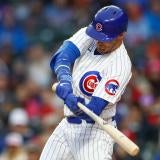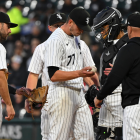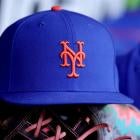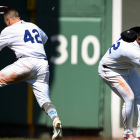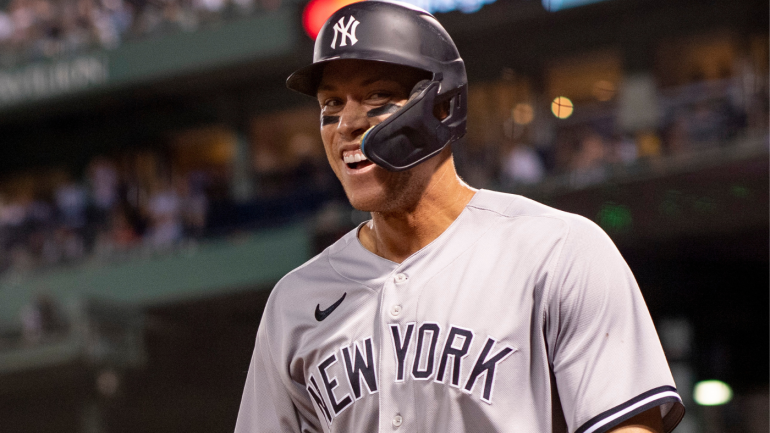
Exactly one week ago, I outlined why the race for AL MVP might be a little closer than many people are considering. I didn't take any sides, but instead illustrated all the reasons that Shohei Ohtani shouldn't be outright dismissed against Yankees slugger Aaron Judge. The biggest pushback I got from pro-Judge people usually involved comparing the two teams for which those players suit up. Specifically, the Yankees are in first place and the Angels are terrible, so that means Ohtani couldn't possibly be as "valuable" as Judge.
That's incredibly frustrating. We can do so much better. There's a strong case to be made that Aaron Judge should win the MVP that doesn't involve "his teammates are better than Ohtani's."
Just to reiterate some points made last week, here are my thoughts, for the millionth time (this might not even be hyperbole), on people leaning so heavily on team performance for an individual award in baseball:
This isn't basketball, where one player can dominate the ball on offense every single possession and then can guard the best player on the other team every defensive possession. There's simply only so much one baseball player can do. He can only bat once every nine spots in the lineup, sometimes only three times a game. Usually, it's four times a game, hardly a large enough share of the offensive "possession" to adequately move the needle on a nightly basis for a bad team. On defense, he can only impact the play when the ball is hit in certain places. Sometimes for an outfielder like Judge, that would be zero times in a game. When it comes to pitching, a player still only impacts one side of the game and that's only once every five games for starting pitchers -- and maybe one or two innings every few games as a reliever.
All this is to reiterate a mantra we've used here for years: Baseball is an individual sport masquerading as a team game. It's a series of individual matchups. One player can't actually "carry" a team.
A good number of people translated this as "Matt would vote for Ohtani" and even "Matt hates the Yankees."
Au contraire.
I'd vote for Judge. I just get tired of bad arguments. Team performance doesn't have anything to do with Judge being a worthy MVP. It's an individual award. As an individual, he's more than deserving.
One of my colleagues recently said to me, "it was going to take a historically great season to beat Ohtani, and, well ... "
Yep.
It isn't just that Judge is leading in lots of categories or has huge counting numbers. He's lapping the competition.
The home runs are the headline and they should be. Judge has 57 heading into Thursday and he's very likely to be the first player to top 60 without a cloud of PED suspicion since 1961. That, greatly, matters to a lot of people (believe me, I've heard plenty about it in light of this).

CBS Sports HQ Newsletter
Your Ultimate Guide to Every Day in Sports
We bring sports news that matters to your inbox, to help you stay informed and get a winning edge.
Thanks for signing up!
Keep an eye on your inbox.
Sorry!
There was an error processing your subscription.
Perhaps more impressive than that -- which is really saying something -- is how much Judge is crushing everyone. No one else has 50 homers. No one else even has 40. Kyle Schwarber is the NL leader with 37 home runs. In the AL, Mike Trout is second with 35.
Since Babe Ruth, the other runs at 60 homers came in tandems. Mark McGwire and Sammy Sosa had each other. When Barry Bonds hit 73, Sosa hit 64. Roger Maris' 61-homer season was part of the M&M boys, as Mickey Mantle hit 54. In 2017, Giancarlo Stanton hit 59 and Judge had 52. Ryan Howard's 58-homer season in 2006 saw David Ortiz hit 54. And so on.
It's funny that usually when Babe Ruth has been invoked in MVP discussions these last two seasons it's due to Ohtani and his two-way prowess, but this time around, it's Judge. The last time we saw a hitter dwarf the field like this in home runs was Ruth. No player has had a 20-plus home run lead since Ruth finished 1928 with 54. Hack Wilson and Jim Bottomley finished tied for the NL lead with 31 (Lou Gehrig was second in the AL with 27).
That's how you turn an argument on its head, right? Judge is the one doing something for the first time since Ruth now.
Given that the home run is the single best thing a hitter can do on any given plate appearance, we could probably stop here and there would be a case for Judge.
There's so much more than the home runs, though.
Marcus Semien of the Rangers is second in the AL in runs scored with 90. Judge has scored 117 times.
Bo Bichette is second right now with 278 bases while Judge has a ridiculous 353. He leads with 80 extra-base hits (Jose Ramírez is second at 72).
Judge leads the league in times on base, thanks to sitting fifth in hits despite leading in walks.
Speaking of getting on base, Judge leads the league on-base percentage (.413). He is absolutely destroying the field in slugging percentage (.688 to Yordan Alvarez's .598 among qualifiers) and OPS (1.102 to Alvarez's 1.000). OPS+, yep, it's Judge's 208 to Alvarez's 182 and then you have to go back to 152 to find third place.
OBP and slugging, especially when used in tandem, are much more important than batting average because of how much better context they give us regarding individual hitter performance. Still, the argument used by many old-schoolers that most of us don't care about batting average anymore is overblown. It still matters, even if it matters less than other stats.
On that front, Judge's average is also turning heads right now. At .310, he sits tied for third in the AL (Luis Arraez leads at .320). To be that high in average while also hitting so many home runs is a significant accomplishment.
The Yankees broadcast on YES has trivia each game and on Tuesday, the question was: When was the last time a player hit at least 50 home runs and finished in the top five in his league in batting average? I guessed Luis Gonzalez, who hit .325 when he crushed 57 homers in 2001. Hilariously, that average was only good enough for 10th in the NL that season. It's possible that would lead the majors this year. Anyway, the answer was George Foster in 1977, when he hit .320 with 52 home runs.
Judge is going to finish with over 60 homers and a batting title is within reach. No one has ever done both. Even if he falls a bit shy in the batting title department, check out that trivia question. He's in rarefied air.
Of course, this segues nicely into talk of the Triple Crown.
I skipped over RBI above so it could be looped in here. Judge has a blowout lead there, too, with 123 compared to Ramírez's 111. For third place in the AL, we have to go back to 96 to find Kyle Tucker.
Judge is going to lead the league in home runs. That's already a done deal. He's very likely to lead in RBI and has a shot to take the batting title. The only triple crown we've seen since 1967 was Miguel Cabrera's 2012 season, and he won MVP.
As noted earlier, there's something to be said for the historic aspect to Judge's season in comparing him to Ohtani. A Triple Crown with over 60 homers? That's never happened before.
If that doesn't do it for you, let's just say that Judge has been the best player in baseball.
As I said last week, when discussing Ohtani, you have to factor in how much he helps both with his pitching and his offense. The gap between Judge's offense and Ohtani's would have to be pretty vast to account for this. Put their offensive numbers side by side and you'll see it is, indeed, vast.
Judge leads the league in home runs, RBI, runs, on-base percentage, slugging percentage, OPS, OPS+, wRC+, total bases, times on base, walks, intentional walks and extra-base hits.
He also leads in win probability added. If you want to talk about a player being clutch and helping his team win, this stat should be for you. For those interested in a more in-depth explanation, I've covered it before. Basically, it's how much a batter has impacted his team's chances to win or lose through the season. Judge is at 7.1. Second in the AL is Trout at 4.2 with Alvarez third at 3.8 and no one else above 3.5. It's another blowout.
Oh, and Judge also leads in WAR. Yes, even looping in Ohtani's pitching with his hitting and baserunning -- speaking of which, did you know Judge has more stolen bases than Ohtani in fewer attempts? -- here is where the two stand in two versions of WAR:
Baseball-Reference:
- Judge, 9.1
- Ohtani, 8.1
Fangraphs:
- Judge, 9.7
- Ohtani, 8.1
In factoring that in with his colossal lead in home runs, runs and pretty big lead in a few other categories like WPA, in addition to the historic nature of the season, it sure seems like Judge's MVP merits stand on their own. You don't need to loop in his teammates to prove it.
Ignore the standings and teammates and other noise. This is the only argument you need:
Aaron Judge is the most valuable player in baseball in 2022 because he's the best player in baseball.







